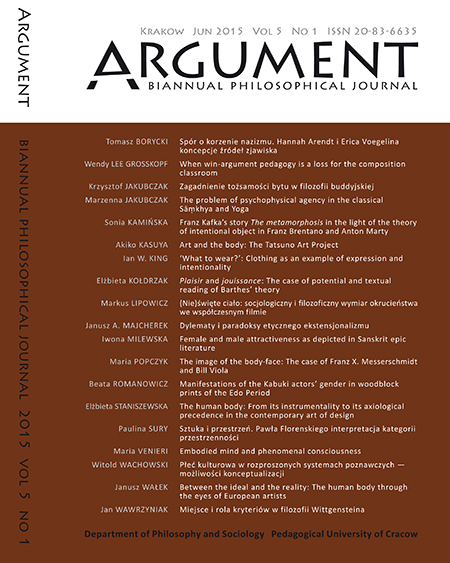Zagadnienie tożsamości bytu w filozofii buddyjskiej
Słowa kluczowe:
Buddhist philosophy, Madhyamaka, Nāgārjuna, selflessness, identity, dependent origination, ontological foundation, ontological reductionism, relationAbstrakt
The problem of identity of being in Buddhist philosophy: The Buddhist philosophical school of Madhyamaka is famous for its statement that things do not have their own inherent nature, essence or self-nature (svabhāva). As a result, it is said that there is no objective foundation of the identity of things. Thus, the identity of things is not grounded in things themselves but is solely imputed and externally imposed on them. Things are what they are only for us, whereas for themselves, or from their ‘own side’ they are empty (śūnya). That is why Madhyamaka philosophy is often compared to the philosophical conceptions inspired by a linguistic reflection (from Ludwig Wittgenstein to Jacques Derrida) which defines the problem of identity in terms of cognitive subjectivism and constructivism. Starting the analysis from the Abhidharma Buddhist tradition I will show that this reading of Madhyamaka view is too narrow. I will demonstrate that it is a result of an assumption, shared by Parmenides and Plato and wrongly ascribed to this Buddhist school, that the identity of being must be grounded in the self-existing, self-defined and (relatively) permanent ontological foundation. This tacit assumption, if rejected, makes any identity a completely subjective and relative construct. The point I am going to argue for, however, is that the Madhyamaka school sticks to an alternative understanding of objectivity; the foundation of all things is nothing but pure relation that precedes, in the ontological sense, all co-related elements (i.e. things). Therefore, the question comes up: how being-in-relationship or ‘relationality’ may be the foundation of identity and what kind of identity it endows. I will try to answer these questions.


